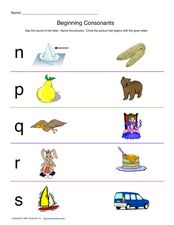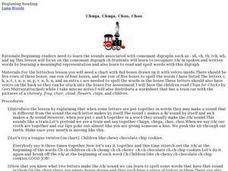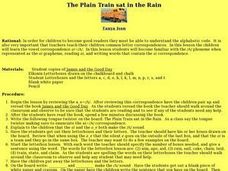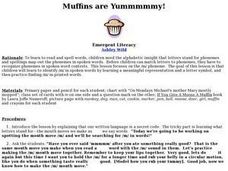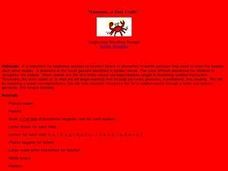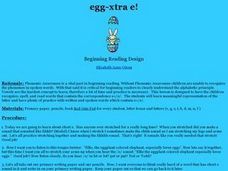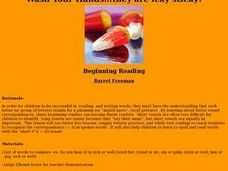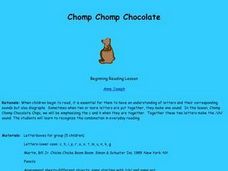Curated OER
Beginning Consonants: Circle the Picture
In this beginning consonants worksheet, students say the sound of five letters and name the two pictures in each row. Students circle the picture that begins with the given letter.
Curated OER
Capital letter A
In this alphabet worksheet, students will cut out the letter A. Students will then cut out 16 pictures and glue those that begin with the letter A onto the large letter.
Curated OER
Beginning Sounds Worksheet
In this phonics worksheet, students look at 4 pictures and circle the beginning letter that each picture begins with. Students sound out each picture to choose their answers.
Curated OER
Chuga Chuga Choo Choo
First graders identify the digraph /ch/ in written and spoken language. After a brief discussion of the independent and combined sounds of the phonemes /c/ and /h/ students practice identifying initial and final placement of the new...
Curated OER
Shhhhh
First graders identify the digraph /sh/ in written and spoken language. After a brief discussion of the independent and combined sounds of the phonemes /s/ and /h/ students practice identifying initial and final placement of the new...
Curated OER
Chug Choo Choo
First graders identify the digraph /ch/ in written and spoken language. After a brief discussion of the independent and combined sounds of the phonemes /c/ and /h/ students practice identifying initial and final placement of the new...
Curated OER
Don't Wake Mama
Students identify the digraph /sh/ in written and spoken language. After a brief discussion of the independent and combined sounds of the phonemes /s/ and /h/ students practice identifying initial and final placement of the new digraph...
Curated OER
The Plain Train sat in the Rain
Students study the ai=/A/ grapheme by reading "James and the Good Day" with a partner and discussing it. Next, they recite a tongue twister focusing on the ai=/A/ correspondence. They make words using their letterboxes and letters before...
Curated OER
Muffins are Yummmmmy!
Pupils explore phonemes. They discuss the phoneme /m/. Students learn a tongue twister to help them identify the phoneme /m/. They read "If You Give A Moose a Muffin." Pupils search for /m/ words while reading the story. They identify...
Curated OER
Speedy, Speedy Students Reading Fast
Pupils review basic reading decoding. Given books at their independent reading level, they read independently and with several different partners to increase reading fluency. They see how many more words per minute they can read after...
Curated OER
"Aaaaaaa...a Fast Crab! "
Young scholars participate in an emergent literacy lesson plan that focuses on the skill of phonemic awareness. The phoneme chosen is the letter "a". They need to correlate the sound to the letter.
Curated OER
O-o-o-oh, no-o-o-o!!
Young scholars engage in an emergent literacy lesson in order to practice the skill of phonemic awareness. They learn this skill using the phoneme for the letter "o". Students must recognize the letter as well as its sound.
Curated OER
Icky Sticky
Students recognize the short vowel i in written and spoken language. Through matching and listening activities, they discriminate the vowel sound /i/ from other phonemes. Students identify the phoneme and letter in pseudo words they read.
Curated OER
Icky Sticky Tin Man
Students recognize the short vowel i in written and spoken language. Through listening and matching activities, they discriminate the vowel sound /i/ from other phonemes. Students associate the phoneme with its letter representation and...
Curated OER
Introduce /Z/
Students explore the alphabet by participating in a spelling activity. In this letter "Z" instructional activity, students discuss the uses of the letter and identify words where it can be found. Students practice making "Z" sounds and...
Curated OER
Egg-xtra E!
First graders recognize the short vowel e in written and spoken language. Through listening activities, they discriminate the vowel sound /e/ from other phonemes. Students identify the phoneme and letter in words and sentences they write.
Curated OER
Can You Open the Creaky Door?
Students recognize the short vowel e in written and spoken language. Through matching and listening activities, they discriminate the vowel sound /e/ from other phonemes. Students identify the phoneme and letter in words and pictures.
Curated OER
Wash Your Hands...they are icky sticky!
Students engage in an emergent literacy instructional activity that focuses on phonemic awareness and they practice corresponding the letter "i" to its long or short sound. This type of recognition has been found to be essential to...
Curated OER
Which Letter Comes First?
In this literacy worksheet, students find the pictures that correlate to the words and they also decide which letter to begin the spelling of each word.
Curated OER
Chomp Chomp Chocolate
Students identify the digraph /ch/ in written and spoken language. Students practice identifying the initial and final placement of the digraph /ch/ in words by identifying pictures containing the sound. They read a decodable story...
Curated OER
Jack the Fat Cat
Young scholars recognize the short /a/ sound in written and spoken words in this lesson. They say a tongue twister which emphasizes words with the short /a/ sound. They then listen to the story "A Cat Nap" and identify the words in the...
Curated OER
Silly Snake
Students practice recognizing and sounding out the letter S. They listen to the alphabet song, "Sea Shell," by Amy Lowell, and view a large picture of a snake in the shape of the letter S. Each student points out other objects found in...
Curated OER
Shiny Shells on the Shore
Students investigate how: A single phoneme, which is a vocal gesture in spoken words, can be represented by more than one grapheme. Also how a digraph is the combination of two letters that make one sound (there are both vowel and...
Curated OER
Say Aaaaa for Apple
Young scholars say words by blending sounds and phonemes. They decode words in order to read and identify and understand the letter a. This phoneme /a/ is one of the short vowels that are needed to read and write. They will show...


